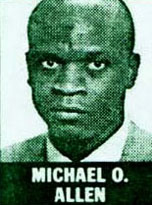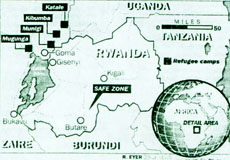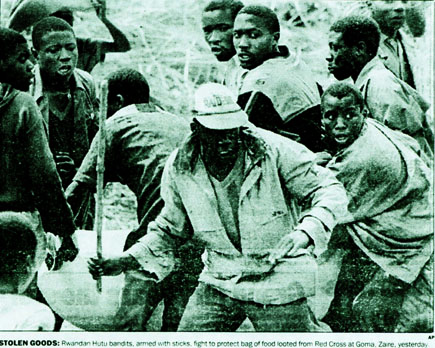 Cholera prompts return
Cholera prompts return
by MICHAEL O. ALLEN, Daily News Staff Writer | Sunday, July 31, 1994
RUBAVU, Rwanda – The road to Kigali yesterday was filled with frustration, anger, sickness and hope that this impoverished nation would step back from the abyss of ethnic hatred.
 Rwandans, young and old, sick and healthy, were trickling back into the nation they fled more than three weeks ago. But the violence that has convulsed this impoverished nation stopped just short of taking another casualty yesterday.
Rwandans, young and old, sick and healthy, were trickling back into the nation they fled more than three weeks ago. But the violence that has convulsed this impoverished nation stopped just short of taking another casualty yesterday.
Lt. Andrew Kalisa, an 11-year veteran of Rwanda’s Tutsi rebel movement, was nearly killed at a checkpoint because a young officer at the barricade did not recognize his superior out of uniform.
Kalisa, 25, was escorting a reporter and photographer to “Camp Cholera,” where Rwanda separates sick refugees so they don’t infect the healthy.
Kalisa and the young officer argued heatedly in Swahili, then the officer came by the passenger window, ordered Kallsa out of the car, then cocked his rifle.
Kalisa took him to a corner and gave him a stern lecture.
“He is from a new battallion,” he said when he returned.
 Continuing on the road to the capital, there was Gisenyi, a border town showing all the scars of a ferocious battle. Burned-out hulks of vehicles were strewn about, along with clothing discarded as town residents fled for their lives.
Continuing on the road to the capital, there was Gisenyi, a border town showing all the scars of a ferocious battle. Burned-out hulks of vehicles were strewn about, along with clothing discarded as town residents fled for their lives.
Raymond Mugabo, 19, said he was in school when rebel forces routed the Rwandan army two weeks ago.
“We left Gisenyi at 4 a.m., he said. “I think 500 or more, a thousand perhaps, many people trying to cross the border. It was terrible.”
As a Hutu, Mugabo is ignoring the new Tutsi government’s appeal that the refugees return home. He fears that Tulsis– men like Kalisa–will be waiting at the other end of a machete to kill him.
Most of those returning, however, have a greater fear of the cholera that has been killing thousands in the refugee camps near Goma, Zaire, where they fled from the civil war between the Hutu government soldiers and the now-victorious rebel Tutsis of the Rwanda Patriotic Front.
Inside Rwanda, RPF soldiers are dOing what they can to build confidence.
At Rugerero, 3 miles from the border, Tutsi soldiers handed out food to grateful returning Hutus.
“We want them to come back. They can see it’S okay here,” said Aloys Hararimana, distributing bowls of corn flour. “Theres no problem here between the Tutsis and the Hutus. The problems that we have here are the lack of beds and water.”
By the roadside, a small bundle of cloth COvers a dead child. Farther along, a man’s body lies in a doorway, his
face a grinning mask of death.
”
But the clear air and lush fields along the road are a relief after the clogging volcanic dust and stench of death
hanging over Goma’s camps.
Kigali, the capital, remains nearly a deserted city, where almost nothing works, where streets have no cars and cars have no drivers.
The Pentagon said Friday a team of U.S. soldier will assess the conditions in Kigali to determine whether food, water and other supplies could be delivered faster to refugees using facilities inside the country.
The United Nations and the new government installed by Tutsis want to make Kigali the hub of relief operations. Food and medical supplies will be trucked from there to all corners of the country, and transit points will be set up to help lure refugees home and care for them along the way.
RWanda’s new prime minister, Faustin Twagiramungu, said people were dying of hunger all over Rwanda and it was important to make Kigali a center for delivering aid to the entire country.
Peter Hansen, UN undersecretary general for humanitarian affairs, said UN officials are worried they will not have enough troops to insure security in the country, especially when the French begin withdrawing their 2,500 troops July 31.
At Camp Cholera, set up just Friday as a way to weed out Rwandans most likely to infect the healthy population with cholera, doctors and nurses tried to help people, many of who seem too far gone for much help.
Dr. Erasmus Sarambulo, a 45-year-old Tutsis, said what has happened to his nation was heartbreaking.
“I feel sorrow,” he said, “sorry to see my people die like this.”
Aid is reversing tide of death in refugee camps, UN reports
GOMA. Zaire – With more Western aid arriving hourly, the United Nations reported some rare good neWS today from Goma’s squalid, teeming refugee camps: a falling death rate.
Although cholera cases are increasing, improved water supplies and medical care have dramatically lowered the fatality rate for Rwandan refugees, officials said.
Ray Wilkinson, spokesman for the UN High CommissiOner for Refugees, estimated the daily number of deaths from
cholera and other diseases at 1,000 to 1,200, down from an estimated 1,800 to 2,000 just four days.
In Brussels, U.S. Defense Secretary William Perry said yesterday the United States is ready to help transport and supply a planned 5,000-member UN peacekeeping forc in Rwanda, but American troops would not join such a force in that troubled country.
Perry spoke en route from Washington to Rwanda, Zaire and Uganda on a whirlwind trip to inspect the growing U.S. military involvement in the region.
